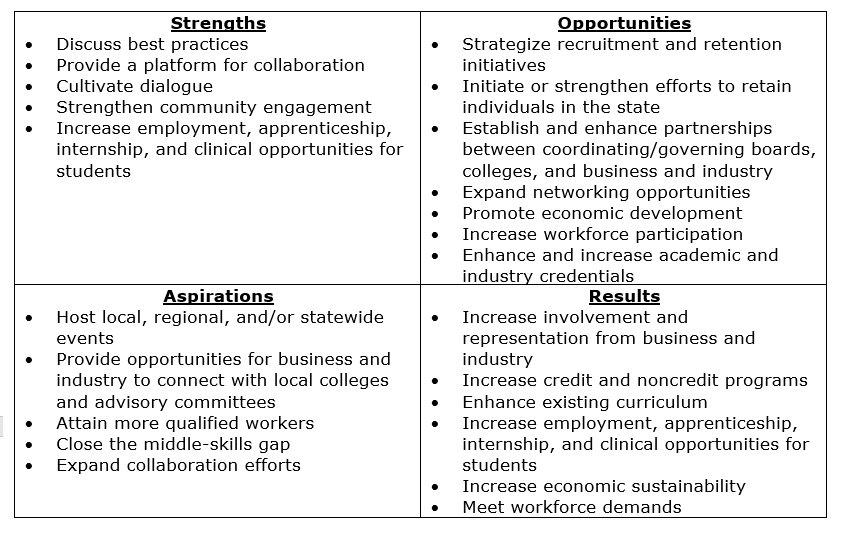Better Together: Enhancing Partnerships in Mississippi

Enhancing partnerships in career and technical education (CTE) is essential to community colleges’ efforts to serve students, businesses, and local communities. These partnerships are critical to designing curriculum; teaching up-to-date content and skills; and staying abreast of technological demands, business trends, and employment expectations. In Mississippi, CTE focuses on developing and implementing research-based instructional programs that meet growing workforce needs and promote economic development (Advance CTE, n.d.). In the 2017-2018 academic year, 20,411 degrees and certificates were conferred by public community and junior colleges (Mississippi Community College Board, 2019). To further advance and support the state’s efforts, Governor-Elect Tate Reeves is committed to improving workforce training and education, and attracting jobs to
Mississippi (The Associated Press, 2019). Therefore, business and industry, colleges, and state agencies, such as Mississippi Community College Board, must continue to enhance their partnerships to ensure that opportunities are provided in a way that meets current and future workforce demands.
Mississippi Community College Board
Mississippi Community College Board (MCCB) is the coordinating board for the state’s fifteen public community and junior colleges. The board’s mission focuses on improving statewide educational opportunities and advancement of the community college system through coordination, support, leadership, and advocacy (Mississippi Community College Board, n.d.). To carry out the board’s mission, its nine divisions provide a variety of services to prepare Mississippi’s workforce through education.
Forums for Partnerships
MeLaverty, Smith, Nutter, and Forster (2015) recommend that business and industry be involved in shaping the educational landscape. Collaborative forums build trust, increase understanding, allow for the sharing of ideas, and enhance partnerships. For example, college-based advisory committees consisting of representatives from business, industry, and state agencies, along with college administration and faculty, provide direction and guidance in areas such as curriculum development, student recruitment, student retention, public relations, facilities and equipment upgrades, and technological recommendations. They also provide the opportunity for business and industry to learn more about CTE programs and how they can address their workforce needs, and allow colleges to learn more about business and industry needs in order to better educate and train students for the workforce.
Another way to create and/or enhance partnerships is for administrators, faculty, or coordinating/governing board employees to serve as college sector representatives on boards or committees of local chambers of commerce, civic organizations, and professional associations. This participation provides opportunities to collaborate and to enhance partnerships for the organizations, colleges, and/or agencies involved.
At MCCB, the Office of Curriculum, Instruction, and Assessment develops CTE program curricula, conducts assessments, and provides professional development opportunities to meet local and statewide economic demands. Business and industry leaders are invited to participate in MCCB initiatives. Their support helps to ensure that the state remains competitive on a national and global scale.
Advantages of collaborative partnerships include
- Increasing technological skills for the workforce;
- Enhancing long-term collaborative relationships;
- Establishing goals and objectives for partnerships;
- Increasing training opportunities for students;
- Providing recruiting opportunities for clinicals, internships, apprenticeships, and employment;
- Providing opportunities to network and exchange ideas;
- Increasing access to resources; and
- Developing marketing strategies
Recommended Practices
The need to be proactive in developing collaborative efforts is supported at the national and state levels. For example, in January 2019 the Association for Career and Technical Education’s issue of Techniques focused on business and community partnerships. On the state level, the Mississippi Community College Leadership Academy program includes opportunities for participants to build and strengthen their professional networks.
The strengths, opportunities, aspirations, and results (SOAR) analysis tool can be used by coordinating/governing boards to justify the need to design events and initiatives that foster collaboration and the enhancement of partnerships with colleges and business and industry. This method outlines strengths and opportunities in relation to aspirations and results that can help to emphasize the importance of hosting local, regional, and/or statewide events.
Designing a platform or model that impacts growth and sustainability requires the involvement of a variety of stakeholders. To promote awareness and respond to the shifting needs of business and industry, coordinating boards/agencies can use SOAR to affirm the need to develop a platform such as a conference or symposium. This platform should involve colleges and business and industry leaders as a way to cultivate and enhance partnerships.
Collaboration Is Key
The SOAR analysis justifies the importance of creating a model for enhancing statewide partnerships between colleges, business and industry, coordinating/governing boards, and other stakeholders. Furthermore, it supports the idea of investing in opportunities and resources focused on advancing the state and its initiatives. To support these efforts, MCCB provides a variety of professional development opportunities in the form of conferences, workshops, leadership development, and faculty development trainings. Such opportunities include the Adult Education Summer Conference, Mississippi Virtual Community College trainings, Early Childhood Academy, and the Workforce and CTE Conference. Being innovative and designing a forum that impacts growth and sustainability requires the involvement of a variety of constituents. Hosting an event such as a conference or symposium is a good investment and can produce positive results for the partners involved, as well as the students we all serve.
References
Advance CTE. (n.d.). Mississippi. Retrieved from careertech.org/mississippi
MeLaverty, A., Smith, S., Nutter, L., & Forster, J. (2015). Creating industry relationships that work. Retrieved from www.nocti.org/pdf/news/techniques/Creating%20Industry%20Relationships%20That%20Work%20-%20May%202015.pdf
Mississippi Community College Board. (n.d.). Vision, mission, and core values. Retrieved from www.mccb.edu/vision-mission-values
Mississippi Community College Board. (2019). Community college report cards: Performance profiles 2012 - 2018. Retrieved from www.mccb.edu/sites/mccb/files/Research%20and%20Effectiveness/Community%20College%20Report%20Cards%202012%20-%202018.pdf
The Associated Press. (2019, November 19). Mississippi governor-elect looks to hire for administration. AP News. Retrieved from apnews.com/0143a865edc34070b4a03dfe453edc5d
Sheriece L. Robinson, Ed.D., is a Curriculum Specialist at Mississippi Community College Board in Jackson, Mississippi.
Opinions expressed in Innovation Showcase are those of the author(s) and do not necessarily reflect those of the League for Innovation in the Community College.











